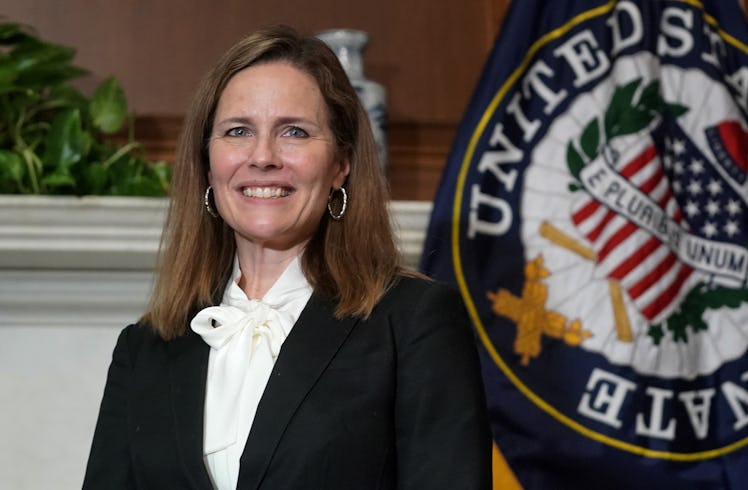
Here’s What To Know About How Coronavirus Could Affect Trump’s Supreme Court Nominee
After President Donald Trump and a number of prominent Republicans' positive coronavirus diagnoses following a Sept. 26 Rose Garden event, the likelihood of pushing through late Supreme Court Justice Ruth Bader Ginsberg's replacement before the election suddenly seems even more up in the air than before. While Senate Majority Leader Mitch McConnell (R-Kentucky) has said that Amy Coney Barrett's confirmation hearings will still begin on Oct. 12 as planned, he was forced to delay the Senate votes by two weeks due to the COVID-19 diagnosis of three Republican senators — and it could throw the whole timeline in jeopardy. Here's what numerous Republican senators' coronavirus diagnoses could mean for Amy Coney Barrett’s Supreme Court confirmation.
While Barrett's speedy confirmation seemed all but set in stone, the aftermath of a Sept. 26 event where Trump announced the federal judge as his Supreme Court pick may have thrown a wrench in the plans. Multiple attendees reported that people were not wearing masks or practicing social distancing during the event, per The New York Times, and the event may be where the president and first lady caught the coronavirus (although that hasn't been confirmed). The president announced the diagnosis on Oct. 1, and as of Oct. 4, Trump is being treated at Walter Reed National Military Medical Center. Meanwhile, three Republican senators (two of whom are on the Senate Judiciary Committee), also tested positive for the coronavirus shortly after Trump revealed his diagnosis. In addition, a number of others have decided to quarantine after exposure to infected colleagues.
Despite this, Republicans intend to go ahead with the original confirmation timeline. While he was forced to delay the Senate's return by two weeks due to coronavirus outbreak, McConnell announced Senate Republicans were still planning to go ahead as planned with Barrett's confirmation hearings in a statement shared on Saturday, Oct. 3. "The Senate’s floor schedule will not interrupt the thorough, fair and historically supported confirmation process previously laid out," he said.
Despite McConnell's assertion that the nomination process will go on as planned, it's possible that Republicans will no longer have enough votes to confirm Barrett to the Supreme Court before Election Day.
Republican Sens. Thom Tillis of North Carolina and Mike Lee of Utah both tested positive for coronavirus on Friday, Oct. 2, along with Ron Johnson of Wisconsin. Tillis and Lee both serve on the Senate Judiciary Committee, which is responsible for conducting the hearings that are the first step in the Supreme Court nominating process. While McConnell has indicated that some lawmakers may participate in the hearings virtually, it's also possible that if senators are unable to vote in person as currently required, the GOP could fall short of the votes needed to move Barrett's confirmation forward.
Republicans currently only have a 53–47 majority in the Senate, and Democrats only need four votes to block Barrett's confirmation, which must be approved by a simple majority. Republican Sens. Lisa Murkowski of Alaska and Susan Collins of Maine have said they will refuse to vote for Barrett's confirmation until after the election. There's also the possibility more senators could become infected with the virus, as many are currently in quarantine to avoid exposing their colleagues — further affecting the vote.
Barrett's road to the Supreme Court has already been marked by controversy and what many have said is a rushed deadline due to the upcoming election. While the whole Supreme Court confirmation process normally takes 70 days on average, there's only 30 days left to go until Election Day.
Critics have also slammed Senate Republicans for deciding to push through a nomination, which would have a lifetime appointment, during an election year instead of leaving it for the next president — in direct opposition of the "election year rule" they argued for in 2016 when Justice Antonin Scalia died. Four years ago, Republicans said they would not vote on then-President Barack Obama’s nomination of Merrick Garland as Scalia's replacement. At the time, McConnell defended his position, saying, "The American people should have a voice in the selection of their next Supreme Court Justice. Therefore, this vacancy should not be filled until we have a new president." Four years later, McConnell appeared to have completely changed his tune, revealing that Senate Republicans would not be following this "rule" in 2020 and that he would help fast-track President Trump's nomination despite the proximity of the Nov. 3 election.
Senate Democrats were quick to condemn McConnell and Senate Republicans for allegedly putting lawmakers' health at risk by insisting on continuing committee hearings. "If it’s too dangerous to have the Senate in session, it is also too dangerous for committee hearings to continue," Senate Minority Leader Chuck Schumer (D-New York), argued in a statement.
"Leader McConnell and Chairman Graham’s monomaniacal drive to confirm Judge Barrett at all costs needlessly threatens the health and safety of senators, staff and all those who work in the Capitol complex," he continued. Schumer's argument stems from the stipulation that senators must be physically present to vote.
Only time will tell whether Republicans have enough votes to confirm Barrett to the Supreme Court at the end of the month, but at the moment, it looks like the possibility of pushing through her confirmation seems up in the air.